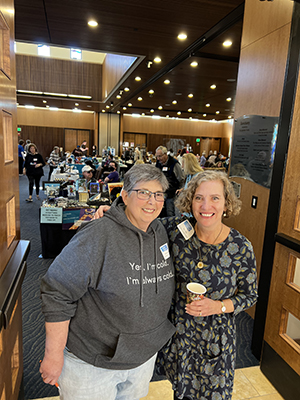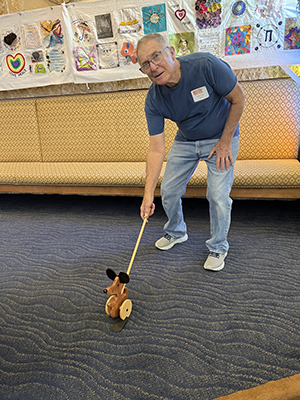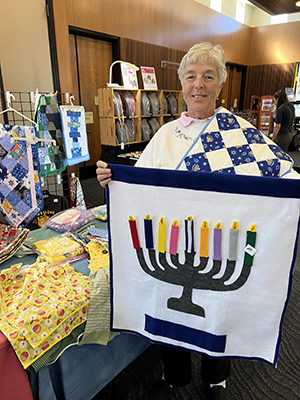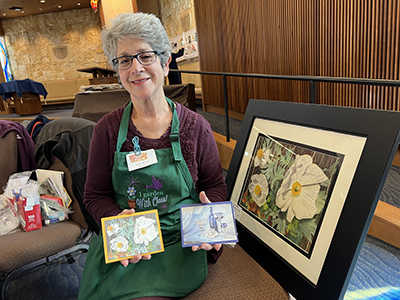By Donald H. Harrison


SAN DIEGO – If you are into schmoozing and picking up fascinating little factoids as conversations progress, try going to an artisans’ festival as I did on Sunday, Nov. 6, at Temple Emanu-El in the Del Cerro neighborhood of San Diego.
Whether I was talking to the organizers or to some of the 30 exhibitors, I found myself enchanted by the people I met at this event from which proceeds will go for scholarships for graduating high school seniors who are members of the Reform congregation.
I learned that co-chairs Pat Libby and Barbara Braasch became friends when they both signed up to attend an adult b’nai mitzvah class a few years ago. Libby wanted to improve her Hebrew and was persuaded the b’nai mitzvah class was a nice way to do it; Braasch wanted to have a bat mitzvah before her twin boy and girl underwent the coming-of-age ceremony. As it turned out, the COVID-19 pandemic prompted all the adult students except Libby and Braasch to drop out of the class. The two persisted, learning from Associate Rabbi Rabbi Benj Fried via Zoom. Their friendship blossomed during their studies.
Libby is a consultant to nonprofits and philanthropists. She engages in strategic planning, executive search work, board governance, and teaching citizens and nonprofits how to engage in legislative advocacy. Braasch works at a law firm, handling operations and technology, a Jill-of-all trades, so to speak.
“We have complementary skills, and we are both very organized,” Libby commented. Braasch, who frequently volunteers for the temple’s Purim festivals, this year decided to become a cochair of the Artisans Festival, and asked Libby to join her. “You roped me into this!” Libby corrected. “Okay,” said Braasch “I suckered her into it.”
Kibbitzing aside, the two worked well together – Libby contacting the exhibitors; Braasch laying out the space for them. This being the first festival since the pandemic, there weren’t as many exhibitors as in the past, and the foot traffic seemed lighter. However, the co-chairs agreed, “It’s a good first step after COVID.”

One of the first exhibitors I chatted with was Charlie Pinkus, a member of the San Diego Fine Woodworkers Association. He was selling various toys for young children, not for his own profit, but in order to buy wood for the association’s charitable work. “When we first got started, we would get a lot of scrap wood from Taylor Guitars – mahogany – but now it is really hard to get really good wood, so the money that we make here is for buying wood,” Pinkus told me. “We give away a lot of toys, but now to make the toys, we have to start buying wood.”
Like many of the exhibitors, Pinkus is a retiree. Now 85, he used to be a professor at California Polytechnic Institute where he taught applied mathematics, some business courses, and some engineering – skills that he said have nothing to do with toymaking, except perhaps for time management, which he taught to engineers.
A member of Temple Emanu-El, Pinkus lives in Coronado, where he has a workshop in his garage. When he started making toys in 2000, there was much to learn. For example, “there are certain toys that we call ‘push toys’ and those are excellent for two-year-olds who are learning to walk because they can push them ahead of them. Then we have toys that are ‘pull toys.’ You don’t want to give a two-year-old a pull toy because they want to see it, and they will try to look at it behind them and they will walk backwards. Well, they can hardly walk as it is.”
There are safety rules that members of his association strictly adhere to. They have a contraption with a hole in it, and if a part can fit into the hole, it is verboten to use it in a toy because little children may put it into their mouths and accidentally swallow it.
Pinkus has grandchildren ranging in age from 3 to 20, and for the littlest one, a granddaughter, he has made a doll bed. Because he makes so many toys with friends who gather in his garage, it is sometimes difficult to remember what he has given to whom. So, when children or their parents ask for a new toy, he makes it a point to ask them, “What have you gotten already?”

Not far from his exhibit table was that of Ann Marie Bassing, a quilter. When Pinkus’s wood group made little cradles, Bassing quilted the bedding for them. Pinkus’s wife Connie is a cousin to Ann Marie’s husband, who is Jewish. Ann Marie is a Catholic, who hails from Henderson, Nevada. She enjoys making decorations for Chanukah – for example a hannukiah wall hanging on which candles can be added each night, and a festive table runner. She noted, however, that the Chanukah decorations were not selling nearly so well as her more utilitarian offerings, probably because the attendees, like the exhibitors, were mostly seniors. As such, they long ago had purchased holiday decorations to be removed each year from drawers and cabinets.
Among the more utilitarian objects, which her attorney son-in-law enjoyed demonstrating to passersby, was an embroidered microwave “bowl” – a 12-by-12-inch two-sided quilt filled with cotton batting, and having “ears” on it. You put a ceramic bowl of soup into the microwave on top of the small quilt, and when it is time to remove it, you grab the ears to form a cradle in which to lift out the bowl. That way, Bassing explained, you don’t burn yourself when taking the ceramic dish out. Bassing, 73, inherited her “mother’s Pyrex dishes, which get hot, and if you have soup or vegetables, the dish gets hotter than the food does.”
Another useful item that comes from Bassing’s quilt machine is a smock for kindergarten and preschool children, “so they don’t get their clothes dirty.”

Between Bassing’s and Pinkus’s exhibit areas was one occupied by Sunny Borkat, a watercolorist who is a Temple Emanu-El member. Prior to retirement, she worked as a physical therapist. At the College Avenue Senior Center, operated prior to the pandemic by Jewish Family Service, Borkat enrolled in a watercolor class. She noted that this was quite different from her physical therapy regimen because instead of moving around, as an artist, she was often sitting at a table.
Borkat likes to take photos when she travels of objects or scenes that she thinks will make for interesting watercolor paintings. Using the photographs as models, she creates watercolor art works that she has shown at the Foothills Gallery in La Mesa. She also takes her watercolors to a printer, who through a photocopying process reduces them in size and prints four to a sheet. These she carefully cuts up and mounts to be used as greeting cards.
At Sunday’s festival, Borkat exhibited more than 100 cards, all of different designs. I asked her which among them were favorites. She said she was particularly fond of one she has hanging in her kitchen, titled “When Sunny Gets Blue” and another, for which she brought the original painting, on a floral theme.
Sometimes, Sunny told me, a group of her fellow watercolorists will come to her house, or she will go to one of theirs, and they will sit together at a kitchen table and work on their art pieces while enjoying good conversation. The paper they use lies flat on the table; they don’t use easels because watercolors run. While Borkat loves to make art, she says he enjoys socializing and gardening even more.
*
Donald H. Harrison is editor emeritus of San Diego Jewish World. He may be contacted via donald.harrison@sdjewishworld.com
Thanks so much for covering the event Don! It was such a fun day. Many of the artists did quite well too. Barbara and I were delighted to be able to resurrect the event and look forward to working on it in 2023.
Very nice job! I think you captured the energy, integrity and beauty of the Artisan Festival. Smoozing was all around by design the way Barbara Braasch created the floor plan.
When my committee retired after 7 years of planning the Festival, we were lucky to pass the baton to two younger women who brought the same love to the Artisan Festival as we put into it.
Even though I didn’t have my hand into the main tasks, I was happy to solicit donations, gift cards and had fun spreading the word. My out-of-town friends came through for me by donations of $25-$100.
I hope Pat and Barbara decide to co-chair Artisan Festival 2023.